PBI-Colombia accompanies the Justice and Peace Commission as armed conflict confines communities in Bajo Calima
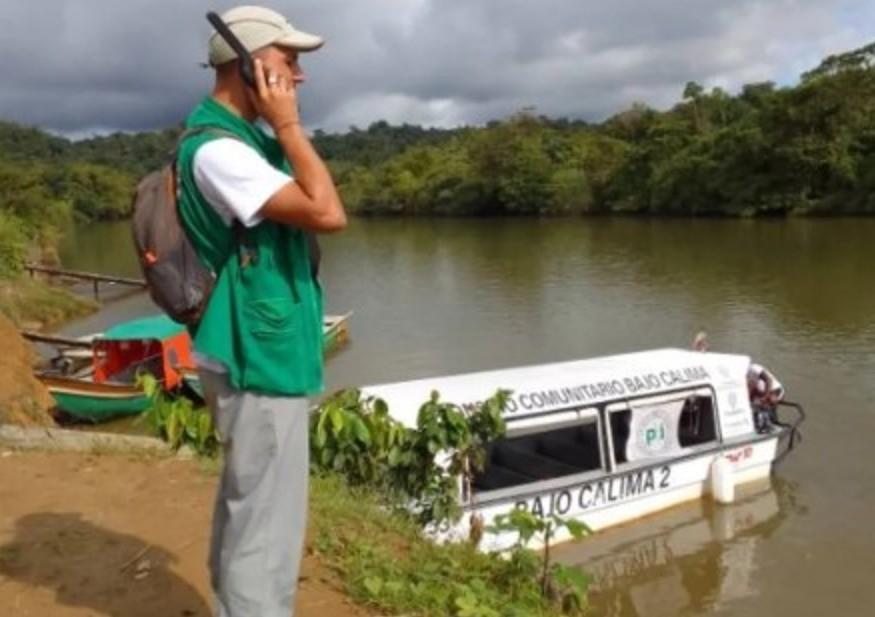
On October 19, the Peace Brigades International-Colombia Project posted on social media:
“Last week, together with @justiciapazcolombia [the Inter-Church Justice and Peace Commission] and the Ombudsman’s Office, we visited the communities of Bajo Calima (Colonias, San Isidro, Nueva Esperanza, Ceibitos, La Trojita, Guadual, and the Santa Rosa de Guayacán biodiverse humanitarian reserve).
There, we observed the humanitarian emergency situation they are facing due to the resurgence of armed violence in their territory. More than 500 families are at imminent risk of displacement, which could become massive if they do not receive an urgent and sustained response to enable them to remain in dignified and safe conditions on the river and in the rural area of Buenaventura.”
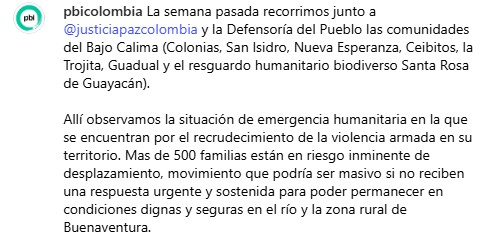
This past February, the Justice and Peace Commission commented on the situation of the Indigenous Wounaan community of Santa Rosa de Guayacán: “Indigenous and black communities along the banks of the Calima River have been victims of increasingly aggressive territorial control by illegal armed structures, including the Gaitanista Self-Defense Forces of Colombia and the National Liberation Army, and most recently by the FARC’s Jaime Martínez column. In view of which they have declared themselves in confinement.”
On October 15, La FM reported: “The representative of Buenaventura, Jefferson Potes, denounced that more than 500 people remain in a situation of confinement due to the armed clashes that are registered in Bajo Calima, a rural area of the special district of Buenaventura, Valle del Cauca.”
That article further explains: “It should be noted that in this rural area of Buenaventura there have been multiple violent actions as a result of the territorial dispute between the ‘Jaime Martínez’ front of the FARC dissidents, the ELN and the Clan del Golfo, for the control of illegal economies in Bajo Calima.”
Diario Occidente adds: “According to the Ombudsman’s Office, at least 516 families – 1,419 people – remain confined to their homes, with extreme restrictions on accessing food, medical services and education. Among the reported human rights violations are targeted killings, enforced disappearances, sexual violence against women and girls, use of drones for attacks, and illegal occupation of homes.”
Last month, the Justice and Peace Commission stated: “The Colombian State is required to adopt real guarantees of protection for communities and the implementation of comprehensive measures that include an effective institutional presence, urgent social investment, and structural actions that address the causes of violence and exclusion. Official announcements or military operations are not enough, an effective policy with a focus on human security that prioritizes life and dignity is required.”
Context
The “Internal Armed Conflict” began in Colombia in 1964 as a struggle between the Colombian army and the left-wing insurgency led by the Revolutionary Armed Forces of Colombia – People’s Army (FARC-EP) and the National Liberation Army (ELN).
By the 1980s, paramilitary groups formed to protect the interests of large landholders and business leaders against the guerilla groups. With the support of the Colombian state, activists were targeted.
By November 2016, a peace agreement was reached between the government and the FARC. This peace agreement did not include the ELN and while there had been a ceasefire with the ELN in 2023 that expired in 2024.
Now, FARC dissidents, the ELN and the Clan de Golfo, also known as Gaitanist Self-Defense Forces of Colombia-AGC (seen as a successor group emerging out of the paramilitarism of the 1980s), battle for territorial control notably related to the illegal drug production and trafficking routes.
Accompaniment
Peace Brigades International has accompanied the Inter-Church Justice and Peace Commission since 1994.
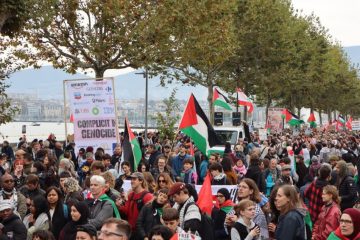
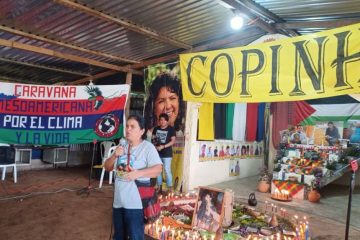
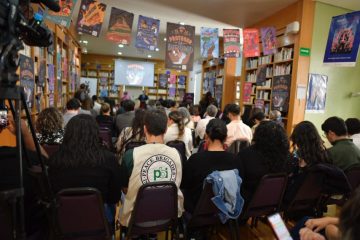
0 Comments